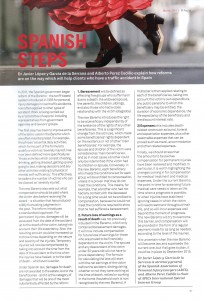Spanish Step

Dr. Javier López y García de la Serrana and Alberto Pérez Cellido explain how reforms are on the way which will help clients who hace a traffic accident in Spain.
In 2011, the Spanish government began reform of the Baremo – the tariff based system introduced in 1995 for personal injury damages in road traffic accidents, now often applied to other types of accident. Work is being carried out by a ‘committee of experts’ including representatives from government agencies and lawyers’ groups.
The first step has been to improve some of the terms used in the Baremo which are often misinterpreted for example, the phrase ‘essential daily activities’, which forms part of the formula to quality a victim as ‘severely injured’, has now been defined more specifically as ‘those activities which consist or eating, drinking, getting dressed, getting up and going to bed, making decisions and any other activities relating to physical or mental self-sufficiency’. This effectively broadens the number of victims who can be classed as ‘severely injured’.The new Baremo also sets out what compensation should be paid where the victim dies before receiving the award – a situation that has produced wildly fluctuating judgments in the past. The reform introduces a standardised approach. For permanent injuries, damages will be assessed from the date of the accident up to the death or the victim, taking into account their life expectancy. Also, the resulting amount could be increased up to three times depending on the nature and severity of the injuries. Temporary injuries will now be compensated by taking into account the time from the date of the accident to the time when the injuries have healed, or the date of death whichever is earlier.
Under Spanish law, damages for death are not awarded to the estate, but to the beneficiaries – and it is this category of damages that will be one of the most substantially affected by the reform:
1. – Bereavement will be defined as affecting five groups who suffer harm due to a death: the widowed suppose the parents, the children, siblings, and also those who had a close relationship with the victim (allegados).
The new Baremo introduces the right to be a beneficiary independently of the existence or the rights of any other beneficiaries. This is a significant change from the old rules, which made some beneficiaries’ rights dependent on the existence or not of other’ main beneficiaries. For example, the spouse and children of the victim were considered as ‘main beneficiaries’, and so in most cases a brother could only be indemnified if the victim had no children or spouse. Conversely, in the new Baremo, each beneficiary who meets the conditions set for each group will be entitled to compensation, unless it is proven that they do not meet the conditions. This means, for example, that a brother who had not had any contact with the deceased for a long time would not be entitled to compensation, because he would not meet the conditions required to show that he had suffered a bereavement.
2. – Future loss of earnings as a result of death was not previously included in the Baremo, which only contained bereavement damages. It will now include compensation for future loss of earnings for those who are proved to be financially dependent on the victim. The suppose and any descendent of the victim under 30 years old will not have prove dependency. The formula for calculating the loss will start with the net earnings of the victim before the accident, distinguishing whether or not they were working at time or death, retired or working in the home (household work is now recognised by the new Baremo). A multiplier is then applied relating to each of the beneficiaries, taking into account the victim’s own expenditure, any public pensions to which the beneficiary may be entitled, the duration of economic dependence, the life expectancy of the beneficiary and the discount interest rate.
3. – Expenses: this includes death related costs such as burial, funeral and expatriation expenses, plus other reasonable expenses that can be proved such as travel, accommodation and other related expenses.
Finally, we should stress that the amounts to be paid as compensation for permanent injuries have been reviewed and modified. In particular, it is worth highlighting the changes coming in for compensation for medical treatment and medical expenses. Under the current Baremo the point in time for assessing future medical care needs is taken as the time when a prognosis is possible, or when injuries have stabilised ignoring cases in which the victim will need treatment throughout their life, and so will incur expenses well beyond the moment of prognosis. The new Baremo will try to overcome this barrier, and compensation will be provided in the form of a regular payment made for as long as needed, according to the level of the injuries.
It is uncertain when the new Baremo will become law and supersede the current one, but if all goes to plan, it could be in place by September 2015.
